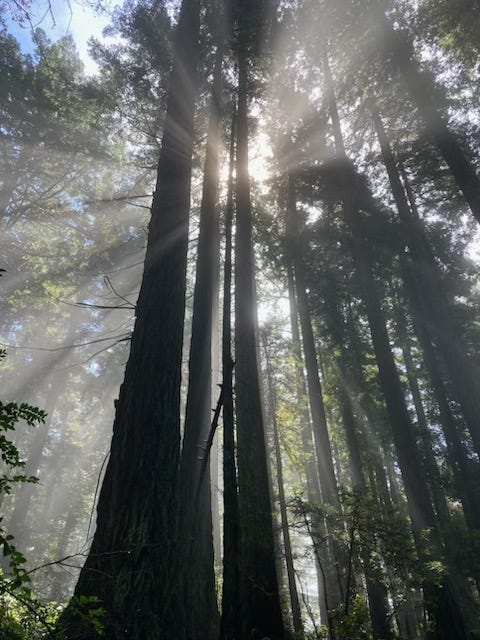The night was warm with crickets and the musty town hall was full of neighbors, all gathered to see the modern day minstrels* passing through. My attention was so locked on the performers, I barely noticed when my 7 year old begin to walk his bare feet up my spine. He draped his heels over my shoulders, and as the tops of his feet curled around my chin, I remembered my body. I noticed my position, folded up on a tiny wool square meant for a kid - while my kid sat in the chair behind me. I leaned back into him and we continued watching the story unfold, strangely entwined, breathing in sync.
It wasn’t a new story, it was one of these fables meant to show us a path through our shame, or grief, or guilt, and get on with living in reciprocity. It went something like this: a village of working people begin to forget to leave their offerings at the well, and in turn begin to forget themselves. They soon get stingy with one another, hoarding and operating from a sense of lack, when one innocent character does something unforgivable: she accidentally cuts down the sacred well tree. Her journey leads her from fleeing the community and her guilt, reckoning with her actions from deep within the forest, and finally stepping back into the community with the key to restore the balance: reciprocity. The story was beautifully told by a trio of singers who slipped easily from harmonied songs to varied characters: blacksmith to snail, woodcutter to mycelium, crow to cambium layer. The show was nearly cathartic in its ability to move an audience to tearful unity.
All of this was delicious, but one thread in particular kept weaving itself through me: the protagonist that began the whole mess of forgetting in the first place? Fog. I lived for decades in San Francisco, Oakland, and the fertile valley of Sebastopol, all shrouded in fog. I know fog. It is not menacing, or even deeply persistent. But it is deeply impactful, and a stretch of foggy days could really do some damage to my sense of self, leaving me wondering if I belonged anywhere.
I’m bent over my computer, contemplating those last words I just typed in the corner of an old used bookstore when an ancient, mostly deaf man ambles up to me and hollers, “are you working here dear?” I offer my kindest smile and say “yes, I am”, secretly wondering if I can call writing ‘work’. He then stumbles over several half-finished sentences before landing on one about the book he’s holding, “do you have something more simple for me to understand, than this?” I have no idea what he’s talking about, but after several more rounds of back and forth, I realize he thinks I work at this bookstore. I also realize that he is grappling deep inside with how to match his words to his thoughts, and his spirit with his mortality. He asks me profound questions like, “Is anyone else here?” “What town am I in?” “How long have I forgotten?” before declaring, “This place is lost on me”. I do my best to make him laugh and let him know he’s not alone in wondering these things before he shuffles back toward his people. His fog is an inner one, but miles deep.
In both these stories the protagonist is fog, and the crippling states are forgetfulness and lost-ness. This makes sense, as the center for navigation and memory is the same; the dual function of the hippocampus being able to wayfind and able to remember. I like to call these hippocampi – shaped like little seahorses behind our ears - our “horns of time”. Without them, we truly are lost.
I walk out of the show contemplating how fog is a vital aspect of a landscape, just like all the other intense weather patterns out there. My question is: can I be in the fog, and still sense something about where I am? And how awake in my body do I need to be to do so? I recall the feeling of small warm feet walking up my spine.
Towards the eastern corner of the dark sky the clouds are shifting and the first full moon of fall is beginning to rise. I take a moment to orient and feel the soft wind, the direction of the big river and the little windy one, notice the linden tree laden with little berries overhead, and feel my son’s hand slip into mine as we set off across wet grass, pointing our horns of time toward home.
*minstrel is used here in the 13th century definition of the word, referencing a traveling singer or storyteller(s) who are welcomed into a community as bringers of art and light.




